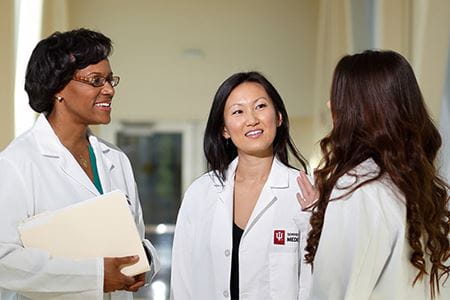Throughout the summer and fall of 2019, the Department of Faculty Affairs, Professional Development and Diversity (FAPDD) and the Office of Research in Medical Education (RIME) developed and implemented plans for Indiana University School of Medicine’s Faculty Learning Communities. The Faculty Learning Communities (FLC) provide learning opportunities centered on medical education research, allowing faculty members to work together on an active, collaborative, year-long program. By working in teams of four to six faculty members, FLC participants are able to provide each other encouragement, support, feedback and a rich learning environment.
“In order to achieve academic promotion, medical educators must do more than simply provide high-quality instruction to their students,” said Komal Kochhar, MD, MHA, director of educational affairs data analytics and director of RIME. “They must also provide evidence of robust educational scholarship, which includes skills that few faculty members have learned as a student or resident. We believe our FLC program is an effective strategy to bolster the scholarly productivity of [IU School of Medicine] medical educators.”
The goal of the FLC and its programming is to enhance faculty members’ understanding of medical education research and the ways that research can be used to increase productivity, creating more nuanced and comprehensive educators. FAPDD and RIME developed three strategies to carry out the FLC program: a monthly educational seminar series that provides faculty with the necessary skills to be medical education scholars; topic-based FLCs that provide faculty with collaborative environments to pursue their research projects; and networking opportunities that allow faculty members to discuss medical education research with each other in both formal and informal settings.
The first cohort of 18 faculty members assigned to four teams completed the program in 2021, and the second cohort of 16 faculty members assigned to three teams is currently underway. The four teams from the first cohort were divided into a competency-based clinical education team, a curriculum and faculty development team, an interprofessional education and professionalism team, and a wellness, diversity, and inclusion team. The second cohort includes a COVID-related educational initiatives team, a wellness team, and a diversity, equity, and inclusion team. About one-half of participants from the first cohort have submitted their work for presentation at a national or regional conference or for publication in a peer-reviewed journal.
“Participants in FLC benefit from the peer support of faculty colleagues pursuing a common goal where everyone works collectively to establish priorities, share ideas, distribute the workload and produce the scholarly products,” Kochhar said. “Faculty members with minimal educational research experience can learn from their more experienced colleagues, and everyone gains new knowledge and skills during the collaborative process.”
Learn more about the RIME FLC program and medical education topics and apply to the program.
